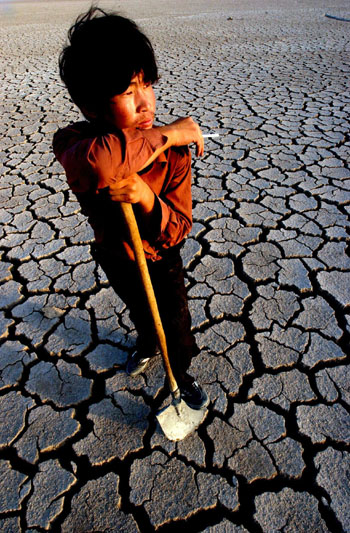| Tools: Save | Print | E-mail | Most Read |
| China Questions and Answers |
| Adjust font size: |
Q: Shortages of water resources, flood disasters and deterioration of the water environment have become common problems faced by all countries. What are the main problems that China is encountering in terms of its water resources and what are the reasons for these problems? What measures will China take to solve them? Along with the severe water shortage, the phenomenon of water pollution and waste is also often seen in the country, due to a longtime lack of awareness of the need to protect water resources. China still hasn't escaped the vicious circle of "developing first, and then treating pollution," which was followed by some industrial countries. In some places, almost all rivers are drying up and all water is polluted. Losses caused by water pollution have far exceeded those caused by water shortages. Currently, the total amount of China's water resources is 2.8 trillion cubic meters, ranked sixth in the world. But the amount of per-capita fresh water is only 2,040 cubic meters, merely one-fourth of the world average. China is one of the 13 countries with the least per-capita water resource, ranked 121st in the world. So, to realize the sustainable use of water resources and to maintain good water ecology has become an important issue in China's economic and social development. With respect to this, China will enhance the protection of its water environment through five measures designed to ensure water safety. First, China will put special effort into designating clean drinking water sources in urban and rural areas, organize related departments to draw up plans for protecting urban and rural drinking water sources, speed up the designation of centralized water resource places in mass rural areas, and prevent and control water pollution caused by the township enterprises and agriculture. Second, efforts will be done to strengthen the prevention and control of water pollution in key river basins, establish a system of controlling the pollutant discharge, practice the licensed discharge of pollutants in accordance with the law, and seriously investigate and punish those who discharge more pollutants than allowed. Meanwhile, China will speed up the revision of the Law on the Prevention and Control of Water Pollution to fundamentally solve the problem of low cost for violating the law but high cost for obeying. Third, the construction of dams is directly related to the safety of the water environment. Thus, the development of river basins and the construction of dams will strictly follow evaluations of their environmental impacts. Projects that seriously threaten the safety of a water environment will not be allowed. Those that have passed an environmental assessment should also implement environmental protection measures according to requirements. Fourth, measures will be taken to continue to check up on enterprises that have discharged pollutants illegally, and make concentrated efforts to investigate and punish the illegal discharge of pollutants by small paper mills, brewing factories, chemical plants, printing and dyeing mills, large-scale breeding farms and urban sewage disposal factories. Fifth, China will make information on the quality of water environments available to the public, guaranteeing people's right to know the environment, and hold hearings when there are programs about the development of important river basins and projects related to water usage, to solicit opinions from the public. This is also a way to fulfill people's right to supervise the environment and to protect people's environmental rights and interests.
|
| Tools: Save | Print | E-mail | Most Read |
 |
| Related Stories |
|
Product Directory China Search |
Country Search Hot Buys |
